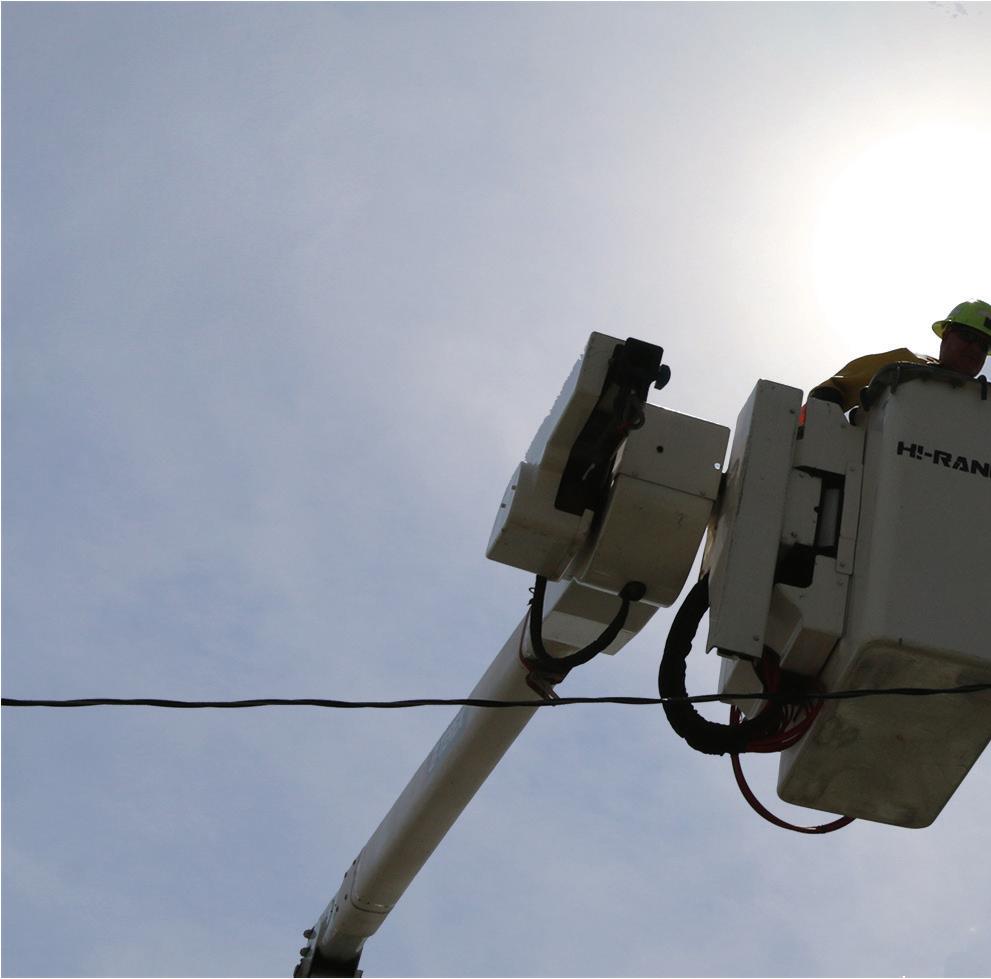
4 minute read
The value of PRINCIPLES
Important principles may, and must, be inflexible. –

By Michael Wilson, Director of Communications
Abuilding along the street of any community will only stand if it is built on a firm foundation. Without a solid foundation, a structure cannot endure the test of time. The same is true in business. Without a foundation of values and principles, a business cannot succeed.
The foundation of the modern cooperative was first laid in 1844, by 28 people who resided in Rochdale, a market town in Greater Manchester, England. These innovators formed a successful business cooperative because they laid a foundation of purpose and guiding principles: member responsibility, member equality, emphasis on education, and concern for the community. Soon, similar successful cooperatives were springing up throughout England and then around the world.
In the 1930 s, the cooperative movement came to rural Ohio, as neighbors joined together with a vision of an electrified rural community. Tired of living life without electricity, the rural residents of Logan County pooled $ 5 startup fees and organized an electric cooperative, using a federal loan program to help cover the rest of the cost. All of us now living in the area continue to benefit from the effort, foresight, and investment of those energy pioneers.
Cooperatives are different


The articles of incorporation, first signed in December 1935, established that Logan County Electric Cooperative would follow the member-owned, not-for-profit, community-focused, cooperative business model. The sole purpose of the co-op’s existence was to serve its members and local community by providing reliable electric service at cost. Those same Cooperative Principles the founders embraced underlie all the co-op does today. All electric companies bring power to the communities they serve, and with that power comes a better quality of life for the consumer. However, investor-owned electric companies exist to provide electricity and to profit from those they serve. But the cooperative formed as a notfor-profit organization focused on serving members and committed to returning financial margins to members in the form of capital credits.
Abraham Lincoln
One of the greatest assets you have available as a cooperative member is the unique kind of personal service an electric cooperative provides. Member services and billing questions are handled locally, by your neighbors, and money paid to our co-op stays in the community. This electric cooperative was built by local citizens and it still exists today to serve the people of our communities.
Members own the cooperative
When you signed up to receive electricity from Logan County Electric Cooperative, you became more than a consumer of our electricity; you became a member of the cooperative. As a member, you joined the ownership group and gained the opportunity to be involved in the cooperative business model.
Logan County Electric Cooperative is solely owned by its active membership and governed under the exclusive control of our members. Because the co-op belongs to the membership we serve — rather than investors and stockholders — our purpose remains steadfast: serve our members and local communities, and stay committed to the cooperative principles.
Self-governed by the members
One critical principle of a successful cooperative is member responsibility, which gives control and governance of the co-op to a local board of trustees. These governing members determine the defining characteristics of the co-op.
Effective governance is vital to our future success, and it is comforting to know that our co-op is led by trustees who are members committed to ensuring the long-term success of our co-op.
While many electricity consumers pay power bills to companies governed by stockholders who demand a healthy profit every quarter, local members set the direction of our co-op. We aren’t under pressure to keep rates high enough to generate profits for shareholders. Instead, we try to keep bills as low as possible while providing exceptional service. After all, the governing trustees pay the same rates other members do.
The trustees also want to see the communities in Logan County succeed. Why? The answer is simple: They live here, too. Local people work for local good. Your trustees support locally beneficial policies and projects because what’s good for our community is good for the co-op.
Your co-op was formed by this community and for this community, and it is still governed by your friends and neighbors. Like you, they want to make their communities and their cooperative stronger.
Accountable to our members
Each month, co-op leaders hold ourselves accountable to the trustees during the board meeting. At these meetings, financial reports are presented in detail, work plans are discussed and approved, budgets are set, and business strategies are discussed. The trustees work to ensure that each decision made at the cooperative best serves the membership as a whole, without giving exclusive benefits to any select group.
Additionally, we hold ourselves accountable directly to the membership at the annual meeting, when we report on the financial stability of the co-op, provide results of the trustee election, and transact other business as needed.
Value of trustee election
As a member, you have a say in how the cooperative is run through your participation in the trustee election. These governing members form a democratically elected board made up of seven co-op members.
The members elected to serve as trustees will hold the position for three-year terms. Each decision the trustees make must be for the immediate and long-term benefit of the members, to provide reliable electric service, with exceptional member relations, while ensuring a secure financial standing.

The success of our co-op is dependent on trustees making wise decisions and our members engaging in the democratic control of the cooperative.
2023 Trustee Election
In 2023, co-op members will elect trustees from District 2 (Richland and McArthur townships) and District 3 (Rushcreek and Bokescreek townships). Both of these districts will have contested elections, and each has an incumbent on the ballot.
By action of the nominating committee, which met Jan. 12, the members listed on pages 20B and 20C have been placed into nomination for trustee of Logan County Electric Cooperative.


Members are encouraged to read each candidate’s biography and participate in the trustee election. Voting will begin May 13, and results will be announced at the annual meeting on June 13. More details regarding the 2023 election will appear in the May edition of Ohio Cooperative Living magazine.
Looking ahead to ’24
For members who live in District 1 (Pleasant, Miami, Union and Liberty townships) and District 4 (Washington and Harrison townships), keep in mind your districts will be up for election next year. The co-op will contact you this fall regarding your interest in serving on the cooperative board of trustees.
The principle of member responsibility is critical to the long-term health of Logan County Electric Cooperative. Please consider how you can be involved in the co-op. Actions such as voting in the trustee election and attending the annual meeting may sound insignificant, but when you participate, you play your part in keeping your co-op locally owned by the membership, locally controlled by the board of trustees, and locally operated by the employees for the benefit of the members.










